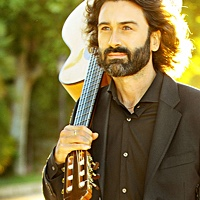Home » Jazz Musicians » Javier Limón
Javier Limón
Javier Limón (born 1973) is a record producer, singer and songwriter born and raised in Madrid, Spain. Limón has worked with several artists, mainly from Spain, since he incorporates elements of flamenco rhythm to his work. Besides his work as producer has also dabbled as an interpreter and has released three studio albums, Limón, Son de Limón and Mujeres de Agua. Since 2003, Limón has done recordings in Palestine, Bogotá, Bristol, Paris, Bahia Blanca, Buenos Aires, New York City and Morocco. In 2004, Limón was awarded the Latin Grammy Award for Producer of the Year for his work on Lágrimas Negras by Diego El Cigala and Bebo Valdés, Cositas Buenas by Paco de Lucia, El Cantante by Andrés Calamaro, El Pequeño Reloj by Enrique Morente, Niño Josele by Niño Josele and Tributo Flamenco a Don Juan Valderrama by various artists.
Background
After completing his musical studies in piano and guitar at the Conservatory of Madrid and at New York's Saint Francis Prep., Limón began his professional career composing flamenco songs for artists such as Enrique Morente, Estrella Morente, Remedios Amaya, Potito and Montse Cortés. Following this first stage, he started his career as a record producer with Cositas Buenas by Paco de Lucia, Lágrimas Negras by Bebo Valdés and Diego El Cigala and El Pequeño Reloj by Enrique Morente. The recording process of Lágrimas Negras, which took three days to record, was filmed by Spanish filmmaker Fernando Trueba. The album earned the Latin Grammy Award for Best Traditional Tropical Album and received a nomination for Album of the Year. Lágrimas Negras stayed in the Spanish Album Charts for over 100 weeks. In 2009, Limón was awarded a Grammy Award for Best Latin Jazz Album for the album Juntos Para Siempre, another collaboration with Bebo Valdés, in duo with his son Chucho.
Musical style and production
To produce, Limón uses editing software such as Pro Tools, Cubase, Logic, mixing material in analog way, not digital, and "edit the album in the appropriate format." Limón acknowledges that in order to make music in modern times, people could "skip all the costs of intermediaries, but there's nothing like a studio where everyone can play at once, but that costs money to keep." The main idea for Limón production style is not to notice the machines involved while recording, so the final result is as close to the real thing happened at the studio. Besides flamenco, there is also other musical interests for Limón, "there's electronic stuff will be interesting to tackle. Now I'm doing some hip hop, which also interests me."
Tags
Music
Recordings: As Leader | As Sideperson










